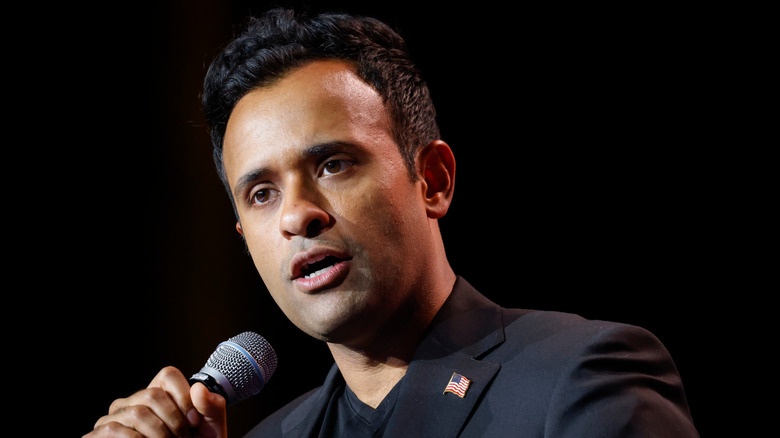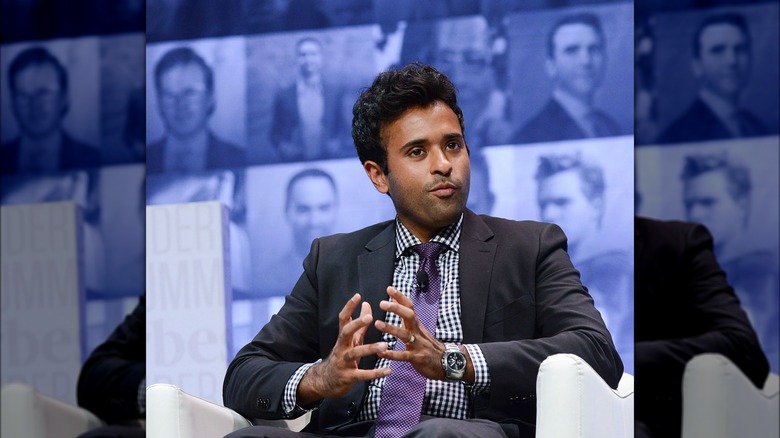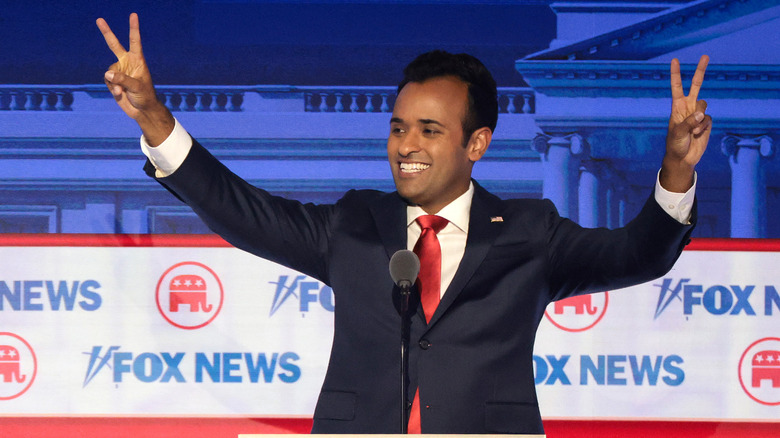Here's How Vivek Ramaswamy Really Made His Staggering Fortune
Biotech and pharmaceutical businessman Vivek Ramaswamy made headlines on February 21, 2023, when he announced he was running for president of the United States. "I am launching not only a political campaign but a cultural movement to create a new American Dream — one that is not only about money but about the unapologetic pursuit of excellence," he penned about his presidential ambitions in an article for The Wall Street Journal.
Speaking of money, however, Ramaswamy's got a whole lot of it — a reported $950 million, to be exact. Interestingly enough, he and his family (including his wife, Apoorva Tewari, and their two sons) don't appear to lead a super extravagant lifestyle. "I don't think we have lived a lifestyle that is radically removed from the one we grew up in," Ramaswamy told Forbes. "We don't have giant vacation homes. We see five of our neighbors' backyards. We have good relationships with our neighbors." But how exactly did Ramaswamy make his fortune? Here's everything we know about how the Harvard and Yale-educated entrepreneur carved out such a massive amount of wealth for himself at such a young age.
Vivek Ramaswamy built his wealth as a hedge fund guy turned biotech entrepreneur
By the ripe old age of 28, Republican presidential candidate Vivek Ramaswamy had already earned an impressive $7 million while working at a hedge fund company. Then, at 29 years old, he opted to strike out on his own with the creation of Roivant Sciences and, eventually, its subsidiary Axovant Sciences. The name of the game? Investing in various pharmaceutical drugs, namely those largely forgotten by other pharmaceutical behemoths. "It's an ethical problem of an underappreciated magnitude," Ramaswamy told Forbes. "So many drugs that would have been of use to society are cast aside. Certain drugs have gone by the wayside for reasons that have nothing to do with their underlying merits." Case in point: Intepirdine, an Alzheimer's drug that Ramaswamy acquired from GlaxoSmithKline for a meager $5 million. Six months later, in June 2015, he took Axovant Sciences public, and the company's value skyrocketed to a staggering $3 billion. Ramaswamy boasted to CNBC that the drug could "help millions of people." He added, "The potential opportunity is really tremendous for delivering value to patients."
Sadly, Intepirdine would ultimately fail during clinical trials. By September of the same year, the company's shares had severely plummeted and were down a hefty amount from the initial public offering price. Then, in January 2021, Ramaswamy announced in a letter to shareholders that he would be stepping down from his role as chief executive of Axovant. But not before walking away with a boatload of cash from his time with the company. Still, he wasn't done yet.
Vivek Ramaswamy waged war on wokeness
In August 2021, Vivek Ramaswamy published his first book titled, "Woke, Inc." wherein he railed against what he described as corporate America's tendency to utilize social justice issues (or "wokeness") to their advantage and the impact that has on society as a whole. But he didn't stop there. In 2022, he waged war on what he referred to as "woke" investing by creating his own investment firm, Strive Asset Management. Per the firm's official website, the firm's mission is to "depoliticize corporate America and restore the voices of everyday citizens in the American economy." By September 2023, Strive had crossed over the threshold of $1 billion in assets.
But now, with Ramaswamy's presidential aspirations firmly in sight, it appears Strive has taken somewhat of a backseat. In 2023, shortly after he announced that he was seeking the Republican nomination in the 2024 United States presidential election, Strive co-founder and president Anson Frericks confirmed that Ramaswamy had stepped down from his role as chairman. TBD as to whether or not that proves to be a lucrative move or not.



